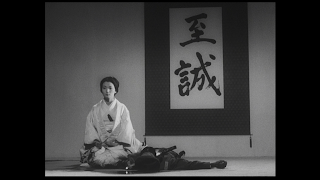He was born in 1925, and sort of snatched away from his family by his weirdly overbearing/violent/high society grandma for awhile -- and it sounds like his dad was pretty abusive too. He barely dodged the draft and sort of came into his own in the post-war lit scene.
"Mishima actually denounced Emperor Hirohito for renouncing his claim of divinity after World War II, arguing that millions of Japanese had died in the war for their "living god" Emperor, and that the Showa Emperor's renouncing his divinity meant that all those deaths were in vain." (Wikipedia)He may have been gay or (bisexual), but it also sounds like his widow tried to shut a lot of those rumors down, so: who knows? It seems he was very strongly fixated on death, and kind of...both the eroticism of and idealization of it -- he apparently circled around suicide a LOT before committing it himself; in 1970 he tried to inspire a coup and then committed seppuku when it failed, an eerie parallel to the movie which he wrote and starred in?! Yep! It's all pretty wild.
Some stuff about this movie!
- The music (the only sound in the film -- no dialogue) is actually kind of random, since they synced it to the end of the film and then just matched up the length. From the Mishima's comments in the liner notes: "I made no attempt to plot the soundtrack, preferring to leave it entirely to chance. The intended effect was that of an avant-garde 'happening.' " I just thought that was cool.
- They shot it in like two days?!
- Some people fainted when they saw it because this was some intense shit for the 60s okay
This movie's very visually striking; are you ready for like a million pictures?!
Delicious minimalism! @0@ That lack of shadow which gives the figures such a surreal, floating flatness here -- I bet the lighting for this was a pain in the ass to set up, but I really dig it!
A lot of the shots with Mishima in the Lieutenant's uniform intentionally obscure his eyes (in the shot above, for example, he actually lifts and turns his head without the viewer seeing them). I can't remember exactly what the liner notes said here, but it sounds like Mishima was going for a kind of objectification, like the uniform was moving around on its own, emptily.
I rather liked that. It brings up a lot of interesting angles, like uniform/duty vs. the man(/person), what people are willing to sacrifice for those ideals, whether those qualities are even separable once you choose to undertake them...th...that kinda stuff, I don't know.
The love scene really... tries to get into this abstraction of the human body as landscape thing -- and frankly that shit is right up my alley.
I also really like the two shots that endcap the love scene -- blogger formatting doesn't really like to cooperate on this, but I'll try to put them side by side:

You can see the parallels, but there's also the swords more prominently/ominously in the background, Reiko's hair has become wild with THE PASSIONS, their limbs are splayed more haphazardly -- Lieutenant Takeyama's posture is more...triumphant, almost? Anyway, love was only the first half of this rite, so let's move right along to the seppuku.
They do actually show some intestines and stuff here, and it's really well done. For all his maybe-idealism of death-as-duty, Mishima also throws in a lot of gritty, visceral physical reality. The Lieutenant, sweating heavily, struggles with his sword, and Reiko has to help hold the collar of his uniform aside before the deed is complete and she goes to get ready for her own suicide. For the record, I think Reiko's kind of a badass. Not for the suicide thing necessarily, but because the Lieutenant asked to die first, so she has to experience her husband/lover's death, and then she has to help him finish in this messy bloodbath, and then she still keeps her shit together and follows him. It echoes, again, those themes of humanity and duty that continue to be a strong motif here.
~Fin!~
In conclusion, some thumbs up! I thought this was really interesting, and I learned some stuff about Mishima, and just...thinkin' 'bout some post-war Japan stuff and falling into Wikipedia for awhile.
Another book post soon, maybe some more moviiiies.
































No comments:
Post a Comment